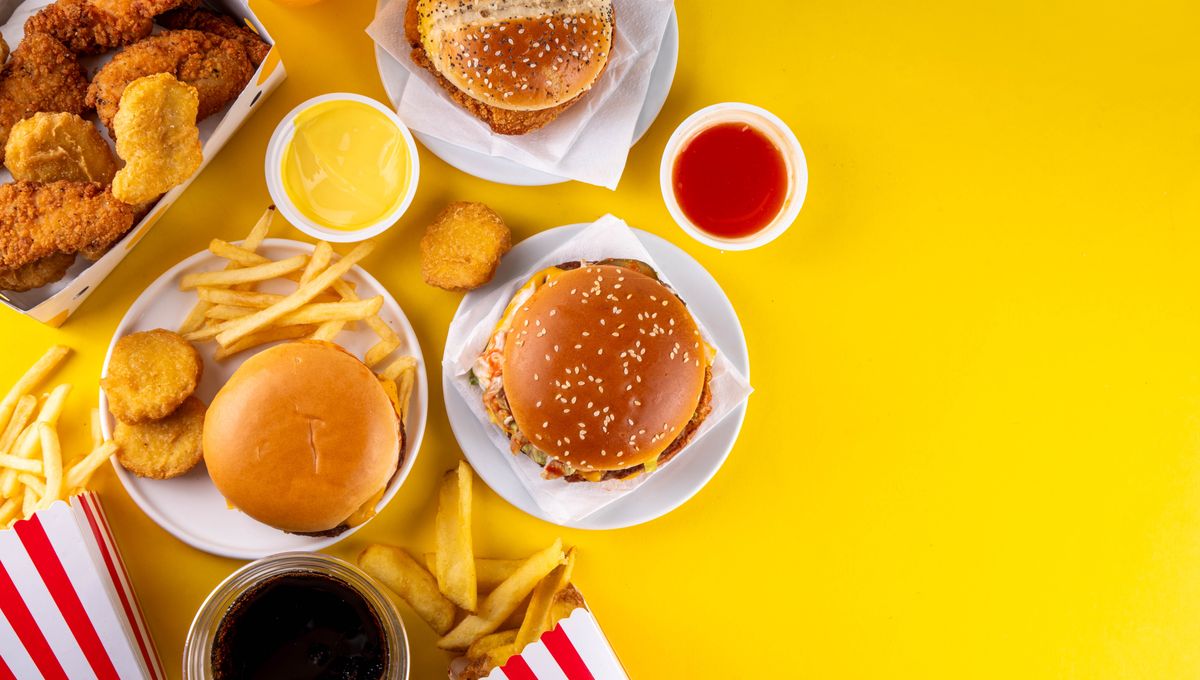
A new study has warned that consuming more ultra-processed foods could potentially accelerate biological aging.
Ultra-processed foods have been getting more media attention in recent years as they continue to be a staple of many people’s diets. These foods are tricky to categorize, even though the term has become increasingly popular. According to the authors of the new study, generally speaking, they use industrial formulations that tend to contain cosmetic additives or ingredients that are rarely used in home cooking rather than whole foods.
A non-exhaustive list of such products includes chips, soft drinks, instant noodles, ice cream, chocolate, biscuits, ready-to-eat meals, burgers, energy bars, sausages, and chicken and fish nuggets. According to BBC Good Food, foods like cereals, baby formula, fruit yogurt, mass-produced bread, and even vegan meat alternatives can also be classed as ultra-processed foods.
Such foods are popular in part because of their convenience and the length of time they can be stored on the shelf – they are often quite tasty too, which adds to their appeal. However, this convenience and palatability comes with a cost, including for our biological aging.
Biological age is a measure of the change, damage, and loss of function in our cells over time. Whereas chronological time accounts for how long we have existed, biological age is how “old” your cells are. Sometimes these two numbers are the same, but sometimes they are different, depending on our overall health and the method of measurement used.
This measure of health is relatively new and can be traced back to 2013, when Steve Horvath, a geneticist, developed the epigenetic clock that measures a person’s DNA methylation levels – the process that modifies how genes function. A few years later, a second generation of epigenetic clocks was devised that also factored in environmental variants, including smoking and chronological age. Examples include the PhenoAge and GrimAge clocks.
Today, we see biological age as being influenced by various factors, including our diets, genetics, general lifestyle, and our environment. Healthier people may have a biological age that is younger than their chronological age, while the reverse can be true for those with less healthy lifestyles, which can include eating ultra-processed foods.
This is an important point in our current situation when life expectancy is increasing across the planet. In fact, the population of those above 60 is likely to double before 2050, reaching almost 2.1 billion people. This will indicate a significant demographic change towards aging populations, which will pose economic and societal challenges, especially as these gains in lifespan may not be matched by gains in healthy standards of life.
In this latest study, researchers recruited 16,055 participants from the US, all aged between 20 and 79 whose health and lifestyles were comparable to other populations living in Western countries. This study utilized the PhenoAge clock for biological age assessment, and relied on data gathered by the US National Health and Nutrition Examination Survey (NHANES) 2003-2010. Diet quality was assessed by the American Heart Association (AHA) 2020 and the Healthy Eating Index 2015 (HEI-15).
The researchers observed a significant association between increased consumption of ultra-processed food and accelerated biological aging. For every 10 percent increase in such consumption, the space between biological and chronological age appeared to widen by around 2.4 months.
Those with diets highest in this type of food (accounting for 68 to 100 percent of their energy intake) were biologically 0.86 years older compared to those in the lowest quintile (39 percent or less of their energy intake in their diets from ultra-processed foods).
This result indicates the importance of prioritizing unprocessed and minimally processed foods as much as possible.
“The significance of our findings is tremendous, as our predictions show that for every 10 per cent increase in ultra-processed food consumption there is a nearly two per cent increased risk of mortality and 0.5 per cent risk of incident chronic disease over two years,” Dr Barbara Cardoso, a senior lecturer in Monash University’s Department of Nutrition, Dietetics and Food explained in a statement.
“Assuming a standard diet of 2,000 calories (8500 kilojoules) per day, adding an extra 200 calories of ultra-processed food, which roughly equals an 80-gram serving of chicken bites or a small chocolate bar, could lead to the biological ageing process advancing by more than two months compared to chronological ageing.”
This association remained significant even after adjustments were made for diet quality and total energy intake, using the same data as a baseline. It suggests the association may come from other factors, including a lower intake of flavonoids or phytoestrogens that occur in whole foods like fruits and vegetables. It could also come from exposure to certain chemicals in packaging or those formed during food processing.
“Adults with higher [ultra-processed food intake] tended to be biologically older,” Cardoso and colleagues wrote. “This association is partly independent of diet quality, suggesting that food processing may contribute to biological aging acceleration. Our findings point to a compelling reason to target [ultra-processed food] consumption to promote healthier aging.”
These results support those from an earlier study that linked this type of food with aging markers, including telomere length (considered a sign of cell aging), frailty, cognitive decline, and dementia. While this work is based on American participants, it is still relevant to other countries that have a high intake of ultra-processed foods such as Australia and the UK.
“Our findings show that reducing ultra-processed foods in the diet may help slow the biological ageing trajectory, bringing another reason to target ultra-processed foods when considering strategies to promote healthy ageing,” Cardoso concluded.
The paper is published in the journal Age and Aging.
Source Link: Eating More Ultra-Processed Foods Associated With Increased Biological Aging